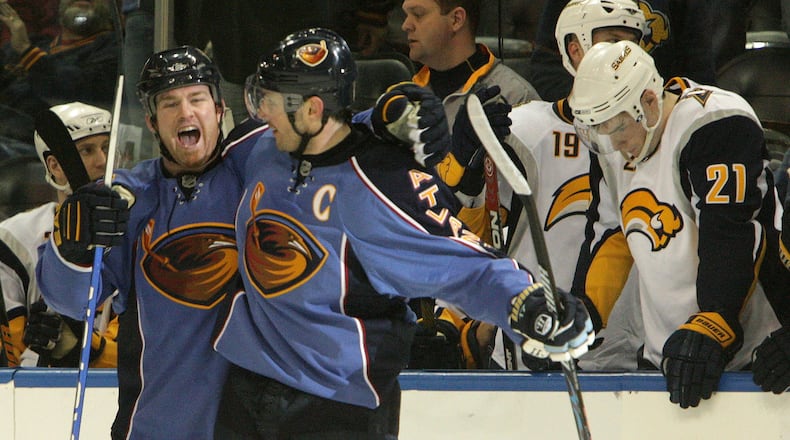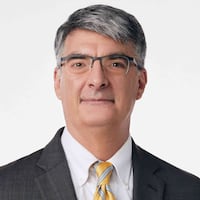Editor’s note: At a time when sports are shut down, including the canceled Final Four in Atlanta and many other postponed events, we take a look (in no particular order) as some of the bizarre moments from Georgia sports history.
It happened to Atlanta — not once but twice.
When you consider that the city lost an NHL team twice in 31 years, both doomed by ownership issues, bizarre is an apt description.
There are seven active NHL franchises that have been relocated. The list begins and ends with Atlanta organizations, first the Flames and then the Thrashers. The Flames played their last game in Atlanta on April 12, 1980, a 5-2 loss to the Rangers, before moving to Calgary. The Thrashers played their last game on April 10, 2011, a 5-2 loss to the Penguins, before moving to Winnipeg. The finales came two days shy of 31 years apart. Both franchises came to Atlanta as expansion teams. Both did not last.
I covered the last game in Thrashers history. It was the final of my two seasons as the beat reporter. I was the last of a group of writers for The Atlanta Journal-Constitution, six of us over 11 seasons of the franchise. Just one covered a playoff series (not me). No one covered a playoff victory.
I have significant experience with Atlanta Spirit, owners of the Thrashers and Hawks at the time. After the group sold the Thrashers, amid internal fights and litigation, I would later become the beat reporter for the Hawks. Atlanta Spirit would eventually have to sell the Hawks too after another bizarre series of events. We’ll save that saga for another story in our series. Maybe it’s me.
There once was ice in Atlanta. It didn’t have to melt like a chocolate bar in the hands of a toddler — or have been as messy.
Even “Miracle on Ice” goaltender Jim Craig couldn’t save the Flames. The expansion franchise was awarded to Atlanta and Tom Cousins, who also owned the Hawks, in 1971. The team began play, in the new Omni coliseum in 1972 and made the playoffs in six of its eight seasons. However relocation rumors began as early as 1976, prompting players and politicians to buy tickets. The Flames signed Craig, who had just led the United States to the Olympic gold medal in Lake Placid. He appeared in four games for the Flames.
Cousins announced his intention to sell the Flames after the final game in 1980, citing financial losses and an inability to sign a television contract. Calgary, Dallas and Houston were rumored destinations. Cousins sold the Flames to Canadian businessman Nelson Skalbania for a then-record $16 million in a deal announced May 21, 1980.
Fast forward 19 years, and the NHL awarded another expansion franchise to Atlanta to begin play in the 1999-2000 season. Again the owner, Time Warner, also owned the Hawks. The group would be sold to the Atlanta Spirit in 2003 and showed promise with rising stars Ilya Kovalchuk and Dany Heatley. The Thrashers’ greatest success came in the 2006-07 season when they won the Southeast Division but were swept in the first round of playoffs by the Rangers.
Atlanta Spirit had issues almost immediately. The three-pronged ownership, with groups in Atlanta, Washington, D.C. and Boston, began a series of lawsuits, first revolving around a Hawks trade for Joe Johnson.
“It’s disappointing,” former Thrashers general manager Don Waddell told The Atlanta Journal-Constitution recently in reflection. “Circumstances were against the Thrashers from shortly after Atlanta Spirit bought the team and, as we all know, the ownership became disjointed and starting suing each other. And it wasn’t even about the Thrashers, by the way. It was all over the Hawks and control. …
“That’s the disappointing thing is that we were never given a fair chance to succeed after all the litigation started between the ownership groups. I truly do believe it could have been different. Circumstances, either from an ownership group or not leading them to litigation between them, that we would still be playing hockey in Atlanta.”
There is no hockey in Atlanta.
Poor results led to declining attendance and financial losses. Waddell went so far as to hold up a sign that read: ‘Please buy tickets’ during a live television interview. Talk about bizarre.
And the relocation rumors started again. Co-owner Michael Gearon told the AJC in February that there was a “sense of urgency” to change the financial setup. I tracked down anyone rumored to have interest. There was never any serious negotiations. I even talked to Tom Glavine, who had a willingness for a small minority share in the Thrashers if it would help keep the franchise in Atlanta.
On May 10, 2011, just weeks after the season, the Glendale City Council agreed to commit $25 million to keep the NHL-run Phoenix Coyotes in Arizona another season. It turned out to be the beginning of the rapid end for the Thrashers. Coincidently, Winnipeg lost its NHL franchise to Phoenix in 1996.
With a commitment to the Coyotes in Arizona and a Winnipeg-based group willing and able to buy and relocate a franchise, the NHL asked Atlanta Spirit co-owner Bruce Levenson whether he wanted to proceed with a sale. Negotiations with True North were underway by May 16, an agreement was made by May 20 and the deal announced May 31. True North paid $170 million to take another franchise away from Atlanta - $110 million went to the Atlanta Spirit and $60 million to the NHL for a relocation fee. The deal would be official with an NHL Board of Governors meeting in New York on June 21.
I was out of the country when the sale was announced, a long-planned trip to Italy. We were in Rome when my then-14-year-old daughter made a Wi-fi connection and announced the news. It was not a surprise as I had written many stories on the pending deal. I remember having an empty feeling that it was all over, a feeling Flames and Thrashers fans still have.
An emotional Gearon was the only owner to speak following the announced sale. “You get in a situation where you are faced with no other options and that’s where we are,” he told the AJC’s Tim Tucker. “It’s emotional. It’s painful. It’s saddening.”
Days after the announcement of the sale, a group of Winnipeg officials visited the Duluth IceForum, where the Thrashers practiced, and Philips Arena. Items were marked for the move north with orange signs that read: “To Winnipeg.” The big and the small, including cereal dispensers in the players lounge, were tagged.
“What took us 12 years to build was gone in 2-1/2 days,” a former employee told the AJC at the time.
Credit: Hyosub Shin/AJC
Credit: Hyosub Shin/AJC
Waddell currently is the president and general manager of the Hurricanes, a team that also relocated. The NHL is shut down because of the COVID-19 pandemic. He was asked whether the loss of the Thrashers was the most bizarre story in his long career in hockey.
“I’m on my second edition now,” Waddle said. “(The Thrashers saga) certainly takes up a lot of my chapters.”
It wasn’t just the NHL. Atlanta lost another hockey team to Canada when the Atlanta Knights of the International Hockey League became the Quebec Rafales in 1996 after four seasons. The minor-league franchise was forced to move with the Omni was torn down to build Philips Arena.
Maybe some things were not meant to be.
MOVING ON
Here are the seven current NHL franchises that have relocated.
About the Author
Keep Reading
The Latest
Featured






